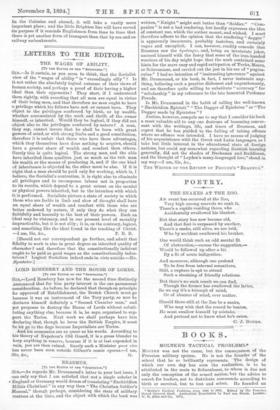LETTERS TO THE EDITOR.
THE WAGES OF ABILITY.
[To TEE EDITOR Or THE " BrECTATOR."1 SIR,—Is it certain, as you seem to think, that the Socialist view of the "wages of ability" is "exceedingly silly " ? Is tt not rather the absolutely logical outcome of their views of human society, and perhaps a proof of their having a higher ideal than their opponents ? They start, if I understand them rightly, with asserting that all men are equal in virtue of their being men, and that therefore no man ought to have a privilege which his fellows have not or cannot have. They object to the privileges conferred by birth, or by wealth, whether accumulated by the work and thrift of the owner himself, or inherited. Would they be logical, if they did not object also to the privileges conferred by nature P A man, they say, cannot insure that he shall be born with great powers of mind, or with strong limbs and a good constitution, therefore it is unfair that those who have these advantages, which they themselves have done nothing to acquire, should have a greater share of wealth and comfort than others. Surely this is quite logical. The strong man, and the able have inherited these qualities just as much as the rich man his wealth or the means of producing it, and if the one kind of inheritance is objected to, the other must be also. If it is right that a man should be paid only for working, which is, I believe, the Socialist's contention, it is right also to eliminate all privileges and to recompense labour not in proportion to its results, which depend to a great extent on the mental or physical powers inherited, but to the intention with which it is performed. Socialists picture a state of society in which those who are feeble in limb and slow of thought shall have an equal share of wealth and comfort with those who are better endowed by nature, if only they do what they can faithfully and honestly to the best of their powers. Such an ideal may be visionary, and in our present level of morality impracticable, but it is not silly ; it is, on the contrary, logical, and something like the ideal found in the teaching of Christ.
[Should not our correspondent go further, and admit that fidelity to work is also in great degree an inherited quality of -character P and therefore that the constitutionally indolent -ought to be paid as good wages as the constitutionally indus- trious? Logical Socialism indeed ends in civic suicide.—En. 'Spectator.]


















































 Previous page
Previous page